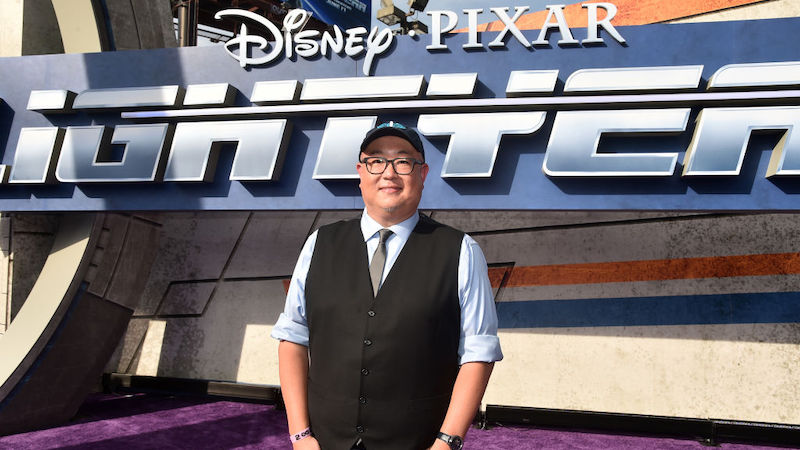ComingSoon spoke to Pixar’s Peter Sohn about voicing Sox in Lightyear, how he’s improved his voice acting over time, and what it meant to work on a Miyazaki movie. Lightyear is out now on 4K, Blu-ray, and DVD.
“A sci-fi action adventure and the definitive origin story of Buzz Lightyear, the hero who inspired the toy, Lightyear follows the legendary Space Ranger after he’s marooned on a hostile planet 4.2 million light-years from Earth alongside his commander and their crew,” says the synopsis. “As Buzz tries to find a way back home through space and time, he’s joined by a group of ambitious recruits and his charming robot companion cat, Sox. Complicating matters and threatening the mission is the arrival of Zurg, an imposing presence with an army of ruthless robots and a mysterious agenda.”
Tyler Treese: Sox is such a fun character. I really like how you capture the robotic feel of him, but you also give him a personality. How did you find that balance for your performance?
Peter Sohn: I think it’s because of my nerdy love for 90s sci-fi. From all of the C3PO and Data from Star Trek, there was a balance of trying to understand. They come from a military unit, and so what I loved about the Star Trek world was that, Data was always like, “Yes, captain,” you know? And so there was a little bit of that ingredient in there that when Buzz was talking about the mission that Sox would play more on the “It’s approximately…” and so there would be this more positive, Android-style voice, but then when it got more intense and I started playing in the more the friendly Sox, and two keys for me was the military version would be like “Yes, Captain.” So this is, you know, the numbers that you need. And then for the friend, it would be “Hey Buzz!” And so “Hey, Buzz!” was my key to get into the friendly side of Sox, when it was appropriate with [director Angus MacLane].
It’s so fun watching the bond between Sox and Buzz develop because at first Buzz is very, you know, rare. He doesn’t really think he needs any therapy or any help. So what did you like most about that arc? Because it’s enjoyable to watch, but it’s also a pretty important message.
Yeah. I think one of the emotional things that I really got from the film was that Sox was a gift from his friend Izzy and that it somehow allowed that relationship to keep going on through the movie as Buzz recognized what this gift was, in terms of them getting closer, and that Buzz was like, “Okay, you know, just figure out this problem and I don’t have to deal with you.” And then switching to, “I don’t want to lose you, I’m going to come back and grab my cat,” you know, that was so satisfying how they worked that out. And as small as that arc is, it just ties to the simplicity of making friends, even if it’s a robot, that they began a bond.
I was curious, you’re not a voice actor by trade, but you’ve voiced so many great characters and you do a great job. Has your approach changed any over the years as you’ve just gotten more experienced?
It was really just trying to find keys into the voice that can sort of…the characters I’m playing are smaller. And so they have a very specific sort of job they need to do. And, trying to find a key to get into that voice is always the game for me, and I didn’t start off with that, it was something that I had learned throughout the process here. , And what it means by finding a key is a phrase of something that connects to that specific tool or usage of that character, which is why I was saying for Sox, it was “Yes, Captain,” and “Hi, Buzz!” Those were the two keys for me for Sox.
You’ve got Elemental coming up, which you’re directing, but you have to always be busy being part of the Pixar senior creative team with everything always moving and so many different projects going on at once. Do you like that? Because I’m sure it never gets repetitive.
It’s great. Directing something here, you get a really great seat at seeing really talented people do their work. From meeting to meeting, you’re really blown away by someone’s art that they created, or a skill that they know in terms of how to make something come alive, or even bringing a voice to a character. Like it’s just constantly being in awe of a lot of the talented folks around you. Yes, and so you’re right, it’s always a different game, but it’s not easy either. And the biggest sort of game that you have to play is to stay objective. Because these movies take so long that you’re always, like, “I’ve seen this joke 7 million times, how do I stay fresh looking at it?”
You helped direct the English dub for Ponyo. What did it mean for you to work on a Ghibli movie?
Peter Sohn: That’s a big one for me. Obviously, Miyazaki films mean a lot, growing up with them and then trying to study them in school, having to get to work with Miyazaki and that whole team and seeing how they work and try to bring something special, and honor the work that they’re doing is probably one of the greatest, lucky things I’ve gotten to do. You know, maybe it’ll be on my tombstone when I die, “Got to work on Ponyo,” you know?











